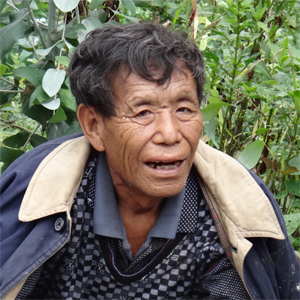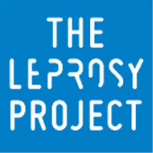
Jiji Rihuo carefully wiped the stool clean before offering it to his guests. He expressed his gratitude to The Leprosy Project. At first he was reluctant to shake hands since for most of his life people avoided contact with him. When we patted his shoulder he relaxed and reached out to shake our hands. Following is his story: I was born in Tuojue Township of Butuo County in 1945. I was the one of three children and had and enviable life with my parents, sister and brother. My father was the accountant for our village in Butuo. I even had the chance to go to school. I loved studying. I went to school happily every day. I hoped to go to secondary school, but in the winter of 1955 when I was 10, I began to lose feeling in my left foot and my skin became numb. I remember this clearly. When I told my father, he did not say anything, but I could see tears running down his face.
Afterwards I regretted telling my father what was happening to me. I should have hidden everything. People from the Township Government and Sanitary Station brought medical equipment to my home every day. Each time they came to our home my mother cried. As time went by, our friends, relatives, and neighbors began avoiding me.
I was isolated and it was very difficult for my parents and sister. My younger brother was too young to understand what was happening, but the rest of the family felt the shame of my illness.
A year after I was diagnosed with the disease, my father, unable to bear the disgrace, collapsed and died. I had brought misfortune and humiliation to our family and I entertained thoughts of suicide. My mother’s kindness saved me. She tried to re-enroll me in school but no school would take me due to my illness. Though we were shunned, my mother never deserted me. My sister tried to visit, but her husband’s family did not allow her to. She was locked up by her husband. She had to live a life without light because of me.
Jiji Ruhuo speaks with Project staff about his life
We lived in isolation for several years. It was time for my brother to get married but no one wanted to marry him. I knew that if I stayed in the village he would never be able to get married. I had to leave for the sake of my brother. Through the County Government I found out that there was a hospital for leprosy in Puge.
My mother and I walked for 4 days to get to the leprosy hospital in Xiangyang Township of Puge County. I was 17. We found a shabby cottage in the village of Senkeluo to live in. We were also assigned work in the field. Fortunately, in this village nobody discriminated against us. We were actually valued by the other villagers. Since I had two years of education, I was assigned a clerical job in the village. I did not have to do manual labor and could even help my mother and lessen her work load.
Honestly, it was not a bad thing that we moved to Puge. I found happiness and a family here. I eventually became a village official. Many people worried about me not being married and tried to set me up. My mother was anxious to see me get married while she was still alive. With the help of other villagers, I met and married the most beautiful girl in this village, Jihuo Moerluo. I was 28.
That is when my good life began. People saw that I was an honest and responsible person, and they let me become the accountant of the village. I did this for more than 30 years. I retired in 2009 when I was 64.
Though my life has been simple, I feel content and happy. My children are all married and have their own families; they no longer have to live with the risk of contracting leprosy. Life has become better and better. I would like to wish everyone in the village a better life and hope that every child will have the chance to receive a better education.
Afterwards I regretted telling my father what was happening to me. I should have hidden everything. People from the Township Government and Sanitary Station brought medical equipment to my home every day. Each time they came to our home my mother cried. As time went by, our friends, relatives, and neighbors began avoiding me.
I was isolated and it was very difficult for my parents and sister. My younger brother was too young to understand what was happening, but the rest of the family felt the shame of my illness.
A year after I was diagnosed with the disease, my father, unable to bear the disgrace, collapsed and died. I had brought misfortune and humiliation to our family and I entertained thoughts of suicide. My mother’s kindness saved me. She tried to re-enroll me in school but no school would take me due to my illness. Though we were shunned, my mother never deserted me. My sister tried to visit, but her husband’s family did not allow her to. She was locked up by her husband. She had to live a life without light because of me.
Jiji Ruhuo speaks with Project staff about his life
We lived in isolation for several years. It was time for my brother to get married but no one wanted to marry him. I knew that if I stayed in the village he would never be able to get married. I had to leave for the sake of my brother. Through the County Government I found out that there was a hospital for leprosy in Puge.
My mother and I walked for 4 days to get to the leprosy hospital in Xiangyang Township of Puge County. I was 17. We found a shabby cottage in the village of Senkeluo to live in. We were also assigned work in the field. Fortunately, in this village nobody discriminated against us. We were actually valued by the other villagers. Since I had two years of education, I was assigned a clerical job in the village. I did not have to do manual labor and could even help my mother and lessen her work load.
Honestly, it was not a bad thing that we moved to Puge. I found happiness and a family here. I eventually became a village official. Many people worried about me not being married and tried to set me up. My mother was anxious to see me get married while she was still alive. With the help of other villagers, I met and married the most beautiful girl in this village, Jihuo Moerluo. I was 28.
That is when my good life began. People saw that I was an honest and responsible person, and they let me become the accountant of the village. I did this for more than 30 years. I retired in 2009 when I was 64.
Though my life has been simple, I feel content and happy. My children are all married and have their own families; they no longer have to live with the risk of contracting leprosy. Life has become better and better. I would like to wish everyone in the village a better life and hope that every child will have the chance to receive a better education.

 RSS Feed
RSS Feed
